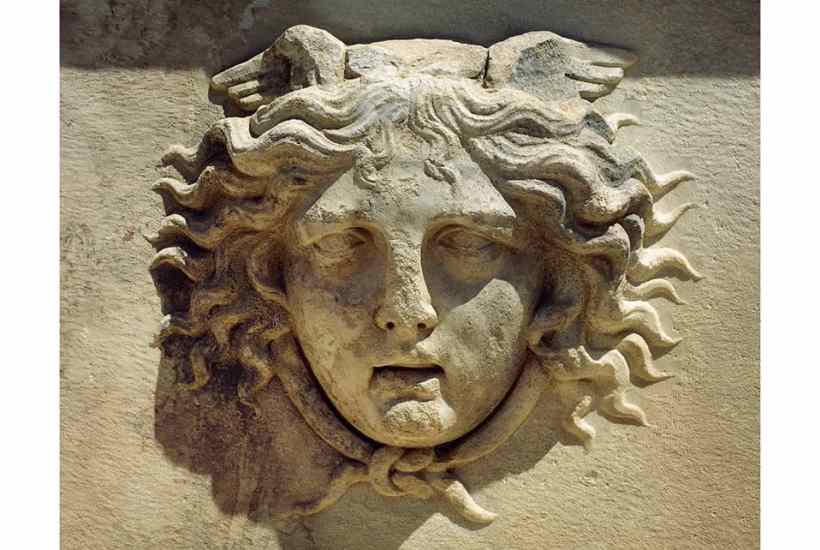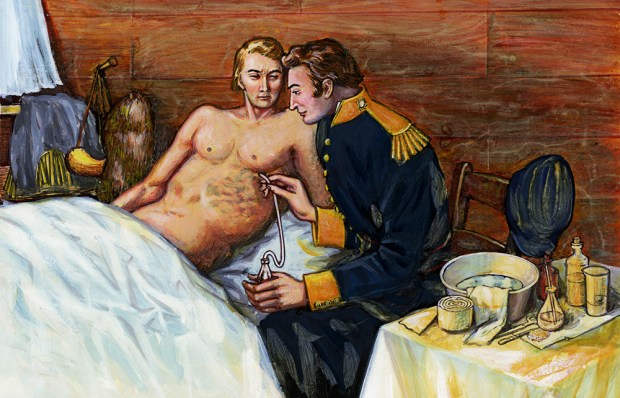Natalie Haynes has been compared with Mary Renault, the historical novelist who scandalised readers in the 1950s with her unflinching portrayal of homosexual relationships in ancient Greece. While the comparison isn’t quite right – their prose styles could hardly be more different – Haynes is certainly alert to what rankles most deeply in modern society, and the ways in which these issues may shape attitudes to antiquity.
In Stone Blind, her retelling of the Medusa myth, women emerge from the other side of #MeToo and reveal the gods and heroes for the dolts and sexual predators they always were. ‘I’m moving because you’re sitting so close that your hip was touching mine and I didn’t like it,’ Athene explains to Hephaestus. A few moments later, the lame-footed god ejaculates on her thigh anyway, proving that even goddesses have a way to go in making their words count.
The sea god Poseidon is the creepiest. His attempted seduction followed by rape of the young Medusa, and his misreading of her sparring as a come-on, feel uncomfortably true to life. His brother Zeus is simply predictable. As his own wife reflects: ‘The only good thing about his sexual incontinence… was its extreme brevity.’ Zeus’s memories, too, are extremely shortlived. It takes Hera to remind him of the not insignificant fact that any son born to him by Metis will be capable of usurping his throne.
Writers have been mocking the moral duplicity of the gods since Homer. Haynes’s approach is more Ovidian in its self-knowledge and humour. Andromeda, one of the many characters she develops in what we might call Medusa’s social network, complains of being betrothed to her paternal uncle: ‘I don’t want to marry a man as old as my father – who even looks like my father.’ Haynes puts her former career as a stand-up comedian to particularly good use in a hilarious chapter on the Gorgons’ sisters, the Graiai, whose comedic potential is obvious once you know that they share a single eye and tooth.
Haynes’s previous novel, A Thousand Ships, was a bestseller. Stone Blind is in many ways a more daring and accomplished book, with multiple narrative viewpoints and even a literal talking head. Her women may be down on men, but there’s nothing overtly moralising in the way she presents them, nor forced about the modern sentiments she has them express. Less successful are the passages in which she address the reader directly with ‘you probably don’t need to know this but I’ll tell you anyway’ type pieces of mood-killing background knowledge. The narrative also meanders towards the end.
There’s real tenderness in Haynes’s portrait of Medusa, a mortal abomination born into a family of divinities, and the efforts of her immortal Gorgon sisters to protect her from herself. Athene is harder to pin down. A victim one moment, a vengeful goddess the next, her punishment of Medusa is horribly irrational, and not even Haynes is prepared to contort the myth to let her off the hook.
Got something to add? Join the discussion and comment below.
Get 10 issues for just $10
Subscribe to The Spectator Australia today for the next 10 magazine issues, plus full online access, for just $10.
You might disagree with half of it, but you’ll enjoy reading all of it. Try your first month for free, then just $2 a week for the remainder of your first year.














Comments
Don't miss out
Join the conversation with other Spectator Australia readers. Subscribe to leave a comment.
SUBSCRIBEAlready a subscriber? Log in